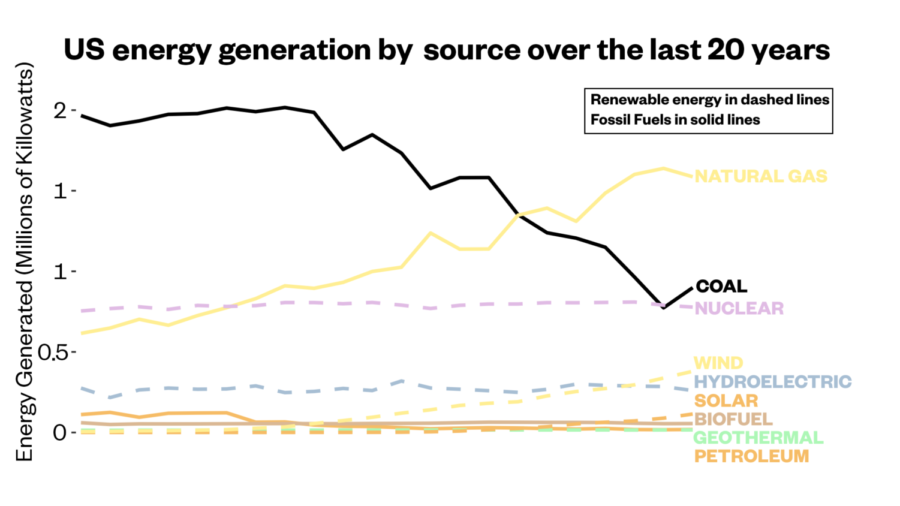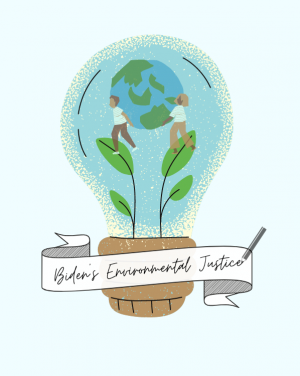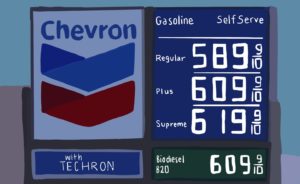OPEC just gambled everything — and it’s working
Renewable sources have been increasingly used for energy generation in the past two decades.
December 17, 2022
When the Middle East makes less oil, it can really only mean one thing: unmitigated disaster. Ever since the U.S. became the world’s leading oil addict in the early 20th century, we’ve involved ourselves in a market that, no matter what level of foreign oil consumption we have, will keep our economy vulnerable and put us at risk for the exact situation of rising oil prices that we are in now. Therefore, it makes sense why the Biden administration has called OPEC’s (Organization of Petroleum Exporting Countries and other producers) decision to cut oil production by 2 million barrels per day a “total disaster” and a “hostile act” that will severely affect global oil prices and is sure to doom us all.
But this cut in foreign oil, though the administration may not realize it, accomplishes the very goal they promised on election night—the goal of a clean energy transition and a greener future.
Ultimately, what better shove could be made towards clean energy than the global oil suppliers making clean energy the only viable and affordable option? Yes, the production cut could have been far more gradual and controlled in order to hinder high economic risk. But in an era where the deadline for climate change irreversibility crawls closer and closer, maybe drastic times do call for drastic measures.
I’ll admit that it is important to acknowledge the economic disaster perspective of this drastic measure taken. For the next few years, this decision could lead to higher gas prices and bigger stress on the average American on top of the already-inflated economy in the status quo, constituting a valid worry. But surprisingly enough, there’s a few reasons that it isn’t as bad as it seems.
First, the fears of high gas prices in the short term are currently being proven wrong, as oil prices have now reached the lowest levels we’ve seen in nine months. This is partly due to a drop in oil demand, and key U.S. oil refineries have come back to add more to the supply, reducing worries about an impending recession.
And in the long term context of energy-demand trends, even if we do end up with higher gas prices, it would be a far better reality than a dying human race. OPEC claims to have made this production cut decision to “foster sustainable stability in the global markets” as they forecast that global energy demand, with oil demand holding the largest share, will increase by 23% from 2021 to 2045 and a failure to meet that demand would result in “heightened volatility.” Yes, the source comes from the exact organization that would want to justify cutting world energy supplies, but the fact stays the same– we need sustainable energy. It’s better to address such a crisis now than in the future when we stand more vulnerable on climate change’s front.
Even if we look to the short term, U.S. domestic oil and gas reserves are ready to serve us until the point where we can be sustainable on alternative fuels. In fact, President Joe Biden made the decision soon after OPEC’s announcement to release 15 million additional barrels of oil from the U.S. Strategic Petroleum Reserves, with 180 million price-cooling barrels already released since March. With 400 million barrels remaining in the stockpile, we may have exactly what we need to reach this greener future.
Renewable energy is already on the trend of accessibility– despite the rising prices of fossil fuels that are partly needed for clean energy infrastructure, renewable power is still cheaper than gas or coal plants, some even arguing that it’s becoming “the cheapest form of power today.” Governments across the world have joined in on this new path too, such as countries in European Union (EU). Even the U.S., under the Inflation Reduction Act, is on track to sourcing more of its electricity from carbon-free sources. At this point, there is no longer a justification for Big Oil’s dominance in the long term.
In the end, this is a sacrifice that is important to take no matter how painful. Whether or not this production cut was made, geopolitical tensions guaranteed that gas prices were always going to find a way to rise, and if Americans bravely face the possible financial consequences of using oil, it will offset the catastrophic consequences of climate change that we will face in the next decade. Even if we just look at the U.S., wildfires are becoming bigger and more frequent across the West Coast, floods have plagued the East and Gulf Coasts, and studies even predict that heat exposure alone could lead to 110,000 premature deaths annually just in the United States. There’s no doubt that an issue exists.
And ultimately, there is truly no better way to push America towards renewable energy than by forcing them. We are in a world where the polarization of revolutionary green energy proposals and Big Oil’s market dominance makes it highly unlikely that any administration will ever be able to pass effective climate change action. We have been offered a choice to either fall back into the fall of our planet or to save it from its destruction, and OPEC, while not the most charitable organization to do so, has given us a clear push towards a greener future. So no matter their intent, who are we to deny this opportunity? The world is being asked to change, so let’s not fight it.







